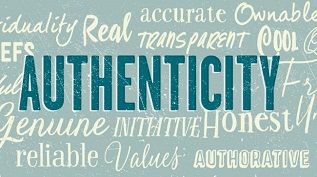Where Does Authenticity Fit Within Our Giving Experience?

Editor’s Note: This blog post originally appeared here.
Rabbi Hillel said: “If I am not for me, who will be for me? And when I am for myself alone, what am I?” Pirkei Avot 1:14.
This text asks us to consider when to stand and act for ourselves and when to act for others. Is it being selfish if I only take care and act for myself? And who am I when I do this?
But let’s be creative. What happens when we reverse this text and ask first, “And when I am for myself alone, what am I?” “Mah ani?” When we can truly answer the question of what am I, then we are better prepared to answer and really understand the question when and how do I stand for myself and for others.
So what can we learn from the importance of being true to oneself?

The definition of authenticity is in fact being true to oneself. Authenticity weaves together the foundation of being genuine and trustworthy by representing one’s true nature or beliefs. The importance of this in engagement, in relationship building and developing an understanding of values, can lift and deepen the experience of collective givers.
The powerful process of authenticity and developing collective values in giving is not a new construct, and certainly not a concept unfamiliar to the ways in which teens are encouraged to learn and experience giving. In Jewish teen philanthropy programs, the importance of allowing teens to be their authentic selves, navigating their complexities and personal values provides an experience that builds their confidence and engagement.
As the new Director of the Jewish Teen Funders Network, a recent transplant in New York from Australia, my first US based engagement was to participate in the inaugural Amplifier Giving Circle Networks Gathering in Grand Rapids, Michigan.
In reflection of my experience at this gathering, my most meaningful experience was being given the opportunity of navigating my personal values, experiences and authentic self, enabled through conversations over The People’s Supper. The People’s Supper is an intention driven space of nourishment through meals and conversations, which encourages the collective group to explore personal values and experiences in a supportive environment. After some niceties of introduction, the conversations quickly moved into Australia’s results of their same-sex marriage survey, with 62% of the Australian public voting yes for equality. Having disclosed my personal connection to this result, I opened up my values of inclusion and respect for diversity. At this table with complete strangers, the opportunity for personal disclosure were now opened. A participant revealed her experience of being a teen mom, something she had never personally spoken about amongst professional colleagues. Another participant opened up about growing up with a mother who was an alcoholic and had committed suicide. The participants came from different backgrounds, ethnicity, faith, sexuality and gender, yet a collective bond formed through contributing ones’ authentic self.
The nature of engagement around this supper table echoed the fundamentals of teen philanthropy programs which enable individuals to speak openly about their lives. It supported sharing stories and building an integrated connection of kindness and respect. As an educator and leader in teen programming, the critical ingredient to connecting youth in teen philanthropy is to provide an opportunity for teens to present their own authenticity in the experience of giving.
Jewish teen philanthropy programs are designed to be inclusive and pluralistic, modelling what we want our community to look like: a community engaged in the common good. Teen philanthropy programs are about allowing teens to learn and work together through a collective giving experience. Program leaders encourage teens to be outspoken about their passions and to commit to social responsibility by examining Jewish values, personal values, fundamentals of philanthropy and leadership in their community. The authenticity of these moments is created by building an inclusive and safe environment through respect and tolerance, empowering the individual to represent themselves honestly and encouraging open dialogue based on respect and kindness for similarities and differences.
When a group develops shared values, participants relate to others who are not like them, and find a common bond which unites. This process challenges perspectives and leads to new growth and learning. This is where we see teens thrive.

As we empower and build our next generation of givers and leaders within our Jewish community, it is important to understand the reciprocal learnings adults and teenagers have for one another. As I look back on my recent experience in Grand Rapids, I recognize the parallels of adult and teen experiences in exploring one’s values in giving and the importance of authenticity in “what am I?” “Mah Ani?” We have the capacity to use the power of authenticity in our roles as contributors and teachers, creating teachable moments for the next generation of Jewish teen philanthropists and changemakers.
